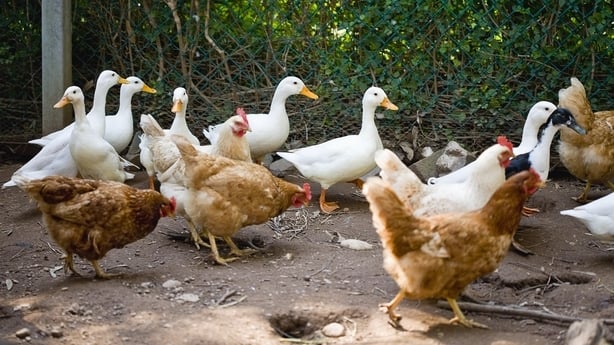A housing order has come into effect from today for poultry flocks and captive birds to protect them from avian influenza.
It follows five detections of the virus - more commonly known as bird flu - in wild birds across Ireland since last December.
Separate detections were made in Galway and Dublin in December, with three more cases last month - in Donegal, Westmeath, and Wexford.
As a result, the Department of Agriculture announced the housing order to protect poultry flocks and captive birds from wild birds that could have the virus.
Meanwhile, in Northern Ireland, 64,000 birds are to be slaughtered at a commercial poultry unit in Tyrone, after the discovery of a suspected case of bird flu there.
Disease-control measures are in place around the suspected outbreak near Dungannon, and samples have been sent off for confirmation.
If confirmed, it would be the first outbreak in a commercial flock this year on the island of Ireland.
A housing order is also in place across the North.
There is particular concern for poultry flocks in border counties, including Cavan and Monaghan.
Members of the public are advised not to handle sick or dead wild birds and to report any such incidents to the Department of Agriculture.
The housing order does not mean food safety is at risk.
The Irish Farmers' Association (IFA) has welcomed the introduction of the compulsory housing order.
IFA Poultry Chair Nigel Sweetnam said it is "a critical step in safeguarding both commercial and backyard poultry flocks from the growing threat of avian influenza.
"Minister for Agriculture Martin Heydon's decision to enforce this measure strengthens our national response to the escalating risk of the disease, which has already led to the suspected infection of 64,000 layer hens in Northern Ireland over the weekend."
If housing is not available, alternative measures must be put in place to minimise exposure.
IFA Poultry Vice Chair Brendan Soden added that "for months, we have been closely monitoring the spread of avian influenza across Europe, and unfortunately, the risk has now reached our doorstep".

'Hard to stop completely'
Assistant Professor of Virology at UCD Dr Gerald Barry said that bird flu is a major challenge that the industry encounters every single year, and farmers live in fear of it, as having an outbreak is becoming an increasingly regular event.
He said that aggressive biosecurity measures do work to an extent to contain the virus, as well as movement and food controls, but there have been clusters of outbreaks even with control measures in place over the years.
"Housing orders is good as we can do to try and stop this, but it's very hard to stop completely as it just spreads in so many different ways," he said.
Speaking on RTÉ's Today with Philip Boucher Hayes, Dr Barry said that having close contact with infected birds could mean there is a risk to the bird owners or someone in contact with a sick bird, and he suggested taking care and contacting a vet as quickly as possible if your birds are sick.
Members of the public are advised not to handle sick or dead wild birds and to report any such incidents to the Department of Agriculture.
The housing order does not mean food safety is at risk.
Stormont took 'swift action' says minister
Stormont's Agriculture Minister has insisted his department "took swift action" over bird flu.
A similar housing order is in place in Northern Ireland.
Andrew Muir also told the Assembly that there will be compensation for culled birds.
The minister faced an urgent question on the matter in the Assembly, and said his thoughts are with those involved with the "family-run farm" that was impacted which he described as a "really excellent operation".
"My department has taken swift action to prevent further incursions, for progressing the necessary measures following the establishment of control zones including licensing requirements and surveillance activities," he told MLAs.
"Humane culling of the birds is also under way at the premises."
He said the Avian Influenza Prevention Zone will remain in place until the risk reduces.







